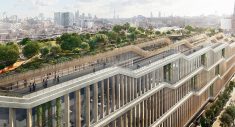Located in the southern coastal area of Shenzhen OCT, the Shenzhen Bay Super Headquarters Base will be an important business and financial centre in Shenzhen serving the Greater Bay Area of Guangdong, Hong Kong and Macau; The proposed development integrates several clusters of corporate headquarters. It creates a global technology hub designed to accommodate 300,000 employees each day. ZHA’s design comprises venues for international conferences, exhibitions, cultural and art programmes, along with residential developments, a transportation centre, botanical grasslands, and coastal zone with wetlands.
Tower C by Zaha Hadid Architects within the Shenzhen Bay Super Headquarters Base responds to its location at the intersection of the city’s planned north-south green axis and Shenzhen’s east-west urban corridor. Connecting directly with its adjacent park and plazas which transform into a terraced landscape extending upwards within its two towers, the design invites the public into the heart of the building where cultural and leisure attractions are housed in sweeping bridges that tie the towers together and give panoramic views of the city.
Served by the expanding Shenzhen Metro network, Tower C’s stepped podium integrates with the park to create a new public space for this dynamic city that has grown to become a global centre of technology innovation. Uniting the park’s landscapes with the civic plazas of the tower’s lower levels provides direct pedestrian access and daylight to the public transport interchange below ground. Prioritising pedestrians, the tower’s design also includes extensive bicycle parking and charging facilities.
Informed by 3D modelling tools developed by ZHA that optimise efficiencies in architectural massing, orientation and facade-to-floor ratios, Tower C’s design is a multi-dimensional vertical city of two towers at nearly 400m, providing column-free naturally-lit office space, shopping, entertainment and dining amenities, together with a hotel, convention centre and cultural facilities with exhibition galleries.

Highly efficient building skin
The double-insulated, unitised glass curtain wall of Tower C’s design steps the glazing as vertical channels for self-shading and incorporates ventilating registers within the channels that draw outside air through operable cavities; providing natural and hybrid ventilation with very effective environmental control for each floor. The design will also incorporate a large photovoltaics array to serve the district with carbon neutral energy.
District cooling
Connected with the district’s smart management systems that continually monitor external and interior conditions, indoor environmental controls will adjust in real time to reduce energy consumption with high-efficiency equipment and chiller plant optimisation within the district’s central networks.

Water conservation
Rainwater harvesting and water recycling strategies will also be implemented in the design.
Aquaponics gardens on all terraced levels will biologically filter contaminants from the local environment.
Low VOC materials
In order to minimise indoor pollutants and particulates while enhancing occupants’ well-being, low-volatile organic compound materials will be installed. Continuing the district’s ambitions for optimal integration of the sustainability principles throughout all aspects of the development, Tower C’s procurement will also target embodied carbon reductions and recycled materials.
The design of Tower C integrates the city and nature within its central green axis with the transit orientated development (TOD) of Shenzhen’s new spine, creating a ‘superscape’ that will become a tower of the future within the Super Headquarters Base.




